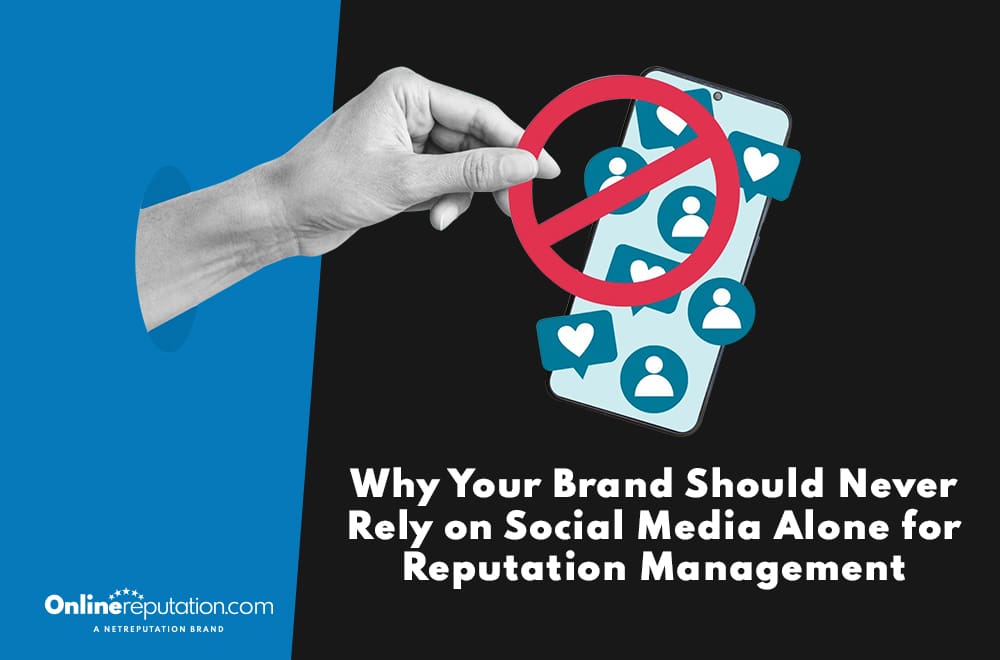
A brand’s reputation is the lifeline of its success. Managing your brand’s reputation is not just about reacting to issues but proactively shaping it. While social media is an essential tool for engagement, relying solely on these platforms for reputation management can leave your brand vulnerable to negative reviews and content. A multi-channel approach is necessary to protect and enhance your brand’s image effectively.
The Importance of Reputation Management for Brands
Reputation management is a vital strategy that directly impacts your brand’s online presence and customer perceptions. With 94% of consumers consulting online reviews before making purchases, a strong reputation helps foster customer trust and loyalty. Companies like e.l.f. Cosmetics and Urban Outfitters effectively leverage reputation management campaigns to build brand trust and engage audiences, even amid challenges like negative reviews. A reputation management strategy that includes responding to customer feedback, managing online reviews, and utilizing sentiment analysis ensures that your brand’s reputation stays strong and helps you build long-lasting relationships with customers.
What is Social Media Reputation Management?
Social media reputation management involves monitoring and controlling your brand’s online presence across platforms like Facebook, Instagram, TikTok, and YouTube. Effective management includes:
- Active Engagement: Responding to comments and messages, addressing concerns, and thanking customers for positive feedback.
- Monitoring Mentions: Tracking brand mentions across search engines and third-party sites helps identify risks or opportunities for growth.
- User-Generated Content: Encouraging content from users can help build trust and strengthen your brand’s reputation.
- Crisis Management: A well-thought-out crisis management plan is essential for responding quickly to any negative content or feedback.
While social media plays a significant role in a brand’s online reputation, focusing solely on these platforms can lead to missed opportunities for business reputation management across other essential channels.
The Dangers of Relying on Social Media Alone for Reputation Management
Relying exclusively on social media leaves your brand exposed to serious consequences, including:
Lack of Control Over Content
Social media is a platform where negative feedback can spread rapidly, potentially causing negative search results. Brands like T.J. Maxx and Wendy’s have experienced backlash due to user-generated content or negative posts that escalate without timely intervention. A brand’s image can be compromised by comments or reviews beyond your control. Reputation management software can help monitor mentions across search engines to stay on top of any evolving customer sentiment.
Vulnerability to Negative Reviews and Comments
When relying solely on social media for online reputation management, your brand is especially vulnerable to negative reviews and comments. Brands like Pepsi and United Airlines have faced significant backlash after incidents led to negative publicity spreading across social media platforms. Addressing feedback quickly is essential for restoring customer trust and safeguarding business reputation.
Limited Reach and Audience Engagement
Social media is not the only avenue for reaching potential customers. Studies show that 51% of mobile users do not rely on social media for brand-related information. Brands should use multiple platforms such as business listings, review sites, and their website to engage customers and enhance brand visibility.
The Role of Other Online Platforms in Reputation Management
To maintain a strong reputation, brands must utilize review management platforms and websites that give customers a space to share their experiences. Reviews on Google, Yelp, and industry-specific sites can significantly influence search engine results. Proactively engaging with customer feedback on these platforms can enhance trust and protect your brand’s image.
Company Website
Your company website is the heart of your brand’s reputation online. It serves as the first place customers visit for information about your products, services, and values. Optimizing your website for search engines and creating content that aligns with your brand promise can enhance customer experience and improve visibility in search results.
Online Reviews and Social Platforms
Online reviews directly impact consumer behavior. In fact, 64% of buyers trust reviews as much as personal recommendations. Brands must actively engage with reviews, whether positive or negative, to show customer satisfaction and improve customer trust.
The Importance of Proactive Reputation Management Strategies
Proactive reputation management strategies are vital to building and maintaining a positive online presence. By monitoring customer feedback and addressing issues early, brands can manage their online reputation effectively.
Encouraging Positive Reviews and Customer Feedback
Encouraging positive reviews is one of the most effective ways to build a strong brand reputation. Customers are more likely to leave reviews when you provide excellent customer service and ask them for feedback. This can be done through SMS messages, email follow-ups, or directly on social media.
Managing Negative Feedback
It’s essential to respond to negative feedback in a professional and personalized manner. Acknowledging concerns and resolving customer issues quickly can turn negative situations into opportunities for growth. Responding to reviews on review sites and social media shows your commitment to improving customer experience and brand loyalty.
How to Strengthen Your Brand’s Reputation Management Strategy
To build a strong reputation online, it’s essential to adopt a holistic reputation management strategy that goes beyond just social media. Here’s how to do it:
- Diversify Your Channels: Leverage SEO, review management, and email campaigns to enhance your online presence.
- Use Reputation Management Software: This helps you monitor your brand’s image across third-party sites, search engines, and social media platforms.
- Respond Promptly to Customer Feedback: Engage with your audience, both positive and negative, to build customer trust and brand loyalty.
Conclusion
Relying solely on social media for reputation management can limit your ability to effectively protect your brand’s reputation. To ensure your brand remains strong, you need a multi-channel approach that includes website optimization, review management, and proactive engagement across various platforms. By using a comprehensive reputation management strategy, you can strengthen your brand’s image, build customer loyalty, and enhance business success.
You might also like
5 Online Reputation Threats You Can’t Ignore in 2025
A brand’s reputation is the lifeline of its success. Managing your brand’s reputation is not just about reacting to issues …
